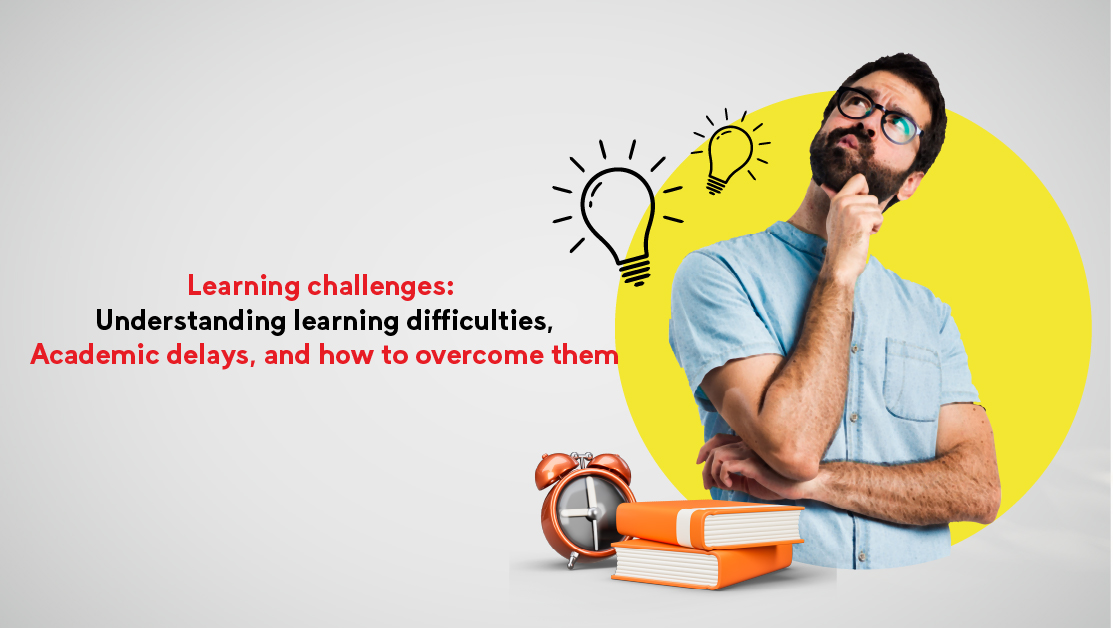
Students all over the world face challenges in their educational journey, including learning difficulties and academic delays, which can affect their academic progress and personal growth. Understanding learning difficulties and academic delays and working to overcome them can contribute to enhancing students’ chances of success and developing their abilities.
In this article, we will clarify the concept of learning difficulties and academic delays and their importance in the field of education.
Concept of Learning Difficulties
Learning difficulties refer to a set of problems and obstacles that students encounter in grasping knowledge and understanding study materials.
These difficulties can arise from various factors such as genetic factors, environmental and social challenges, or differences in teaching styles and students’ needs.
Common learning difficulties that students may face include:
- Reading and writing difficulties.
- Concentration and attention difficulties.
- Dealing with numbers and mathematics.
- Other learning difficulties related to comprehension, memory, organization, and planning.
Academic Delays and Their Causes:
The reasons leading to academic delays are diverse and multifaceted, including:
- Academic reasons: Involving difficulties in specific areas such as reading, writing, and arithmetic.
- Social reasons: Such as difficulties in getting necessary support from family or the community, and discontinuing studies due to economic or health conditions.
- Psychological and emotional reasons: Such as lack of motivation and interest in learning and the psychological pressures faced by students.
Effects of Academic Delays on Students
Academic delays can have negative effects on students, including:
- Academic impacts: Academic delays can lead to a decline in academic performance and achievement.
- Social and emotional impacts: Academically delayed students may suffer from low self-confidence and poor social integration, affecting their quality of life and personal relationships.
- Future impacts: Academic delays can hinder students’ opportunities to secure good job prospects and achieve professional success.
Therefore, addressing learning challenges such as academic delays requires early attention and intervention to promote successful learning for students. It is essential to provide a supportive and motivating learning environment and offer the necessary support through specialized programs and services targeting individual challenges.
Importance of Understanding Learning Difficulties and Academic Delays
Understanding learning difficulties and academic delays is of great importance in the context of education as it can help:
- Identify individual needs of students and provide them with appropriate support and guidance.
- Guide teaching strategies to meet students’ needs.
- Enhance communication and collaboration between teachers, parents, and students to assist students in overcoming challenges.
- Develop specialized and effective educational programs to help students achieve their full academic potential.
There are effective strategies that can be used to overcome learning difficulties and academic delays.
Types of Learning difficulties
Here are some common types and their symptoms:
- Reading difficulties (dyslexia): Involves difficulty distinguishing letters and words and assembling them correctly. Children with reading difficulties may exhibit delayed development of reading, writing, and vocabulary skills.
- Writing difficulties (dysgraphia): Characterized by difficulty organizing and expressing thoughts properly in writing. Children with writing difficulties may have unclear and ambiguous handwriting and difficulty focusing on writing tasks.
- Math difficulties (dyscalculia): It is challenging for children with this difficulty to understand mathematical concepts and basic arithmetic operations. There may be delays in counting, addition, subtraction, multiplication, and division skills.
- Memory difficulties (working memory difficulties): It is difficult for students to retain and organize information effectively in their minds. This may manifest as difficulty in remembering, organizing tasks, and planning.
Diagnosis and Dealing with Learning Difficulties
To address learning difficulties effectively, they must be diagnosed and dealt with appropriately.
There are several methods for diagnosing learning difficulties and helping students overcome them:
- Developmental and academic assessment: Involves evaluating students through standardized tests and the skills required for their grade level.
- Observation and monitoring: Involves observing students’ behavior and performance in the classroom to identify any difficulties they may face.
- Individualized education: This approach caters to the individual needs of students and provides customized teaching to help overcome learning difficulties.
- Additional support: This may involve utilizing additional services such as counseling or digital support techniques to enhance the learning experience.
By implementing these methods and providing appropriate support, students can overcome learning difficulties and achieve academic success.
Strategies to Enhance Educational Abilities
There are strategies that can be used to help them overcome these challenges and enhance their educational abilities.
In this section, you will discover some effective strategies to enhance students’ learning abilities and how to support them in overcoming learning difficulties and academic delays.
Strategies to enhance educational capabilities:
- Providing a suitable learning environment: Creating a conducive learning environment where students feel comfortable and encouraged to participate and learn. This can be achieved through organizing the learning space and providing necessary resources such as books, references, and technology.
- Using diverse teaching techniques: Utilizing various teaching techniques to accommodate different learning styles of students. This may include interactive lectures, collaborative activities, hands-on projects, and visual aids to enhance students’ understanding and comprehension of study materials.
- Encouraging active learning and participation: Students should be encouraged to actively participate in the learning process. This can be achieved through small group discussions, giving students responsibilities in managing parts of the lesson, and encouraging them to ask questions and inquire.
Read More :
Supporting students in overcoming learning difficulties and academic delays:
- Assessing individual needs: Assessing individual students’ needs and focusing on providing appropriate support and assistance. This can be done through assessment tests and personal interviews with students to identify their strengths and weaknesses in studies.
- Providing personal support and guidance: Offering personal support and guidance to students experiencing learning difficulties and academic delays. This may involve one-on-one sessions with student counselors, guiding them in setting goals and plans to improve their academic performance.
- Collaboration with parents and teachers: Collaboration between teachers and parents is essential in supporting students in overcoming learning difficulties and academic delays. Different levels of home support can be provided, such as helping create study schedules, time management, and reviewing study materials.
By implementing these strategies, students’ educational abilities can be enhanced, and they can be supported in overcoming learning difficulties and academic delays.















